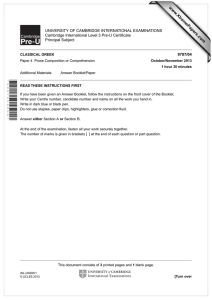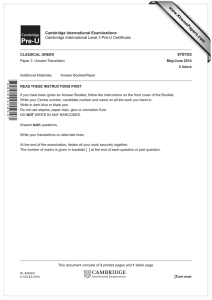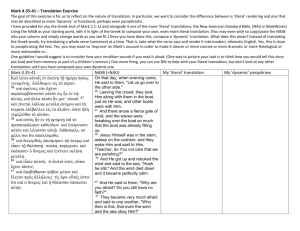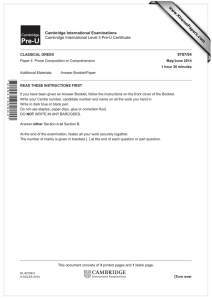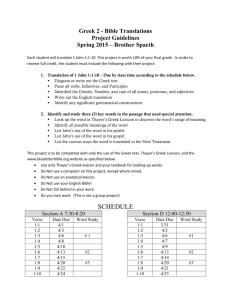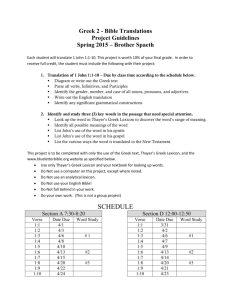Greek Literary Epigram Charles S. Campbell
advertisement
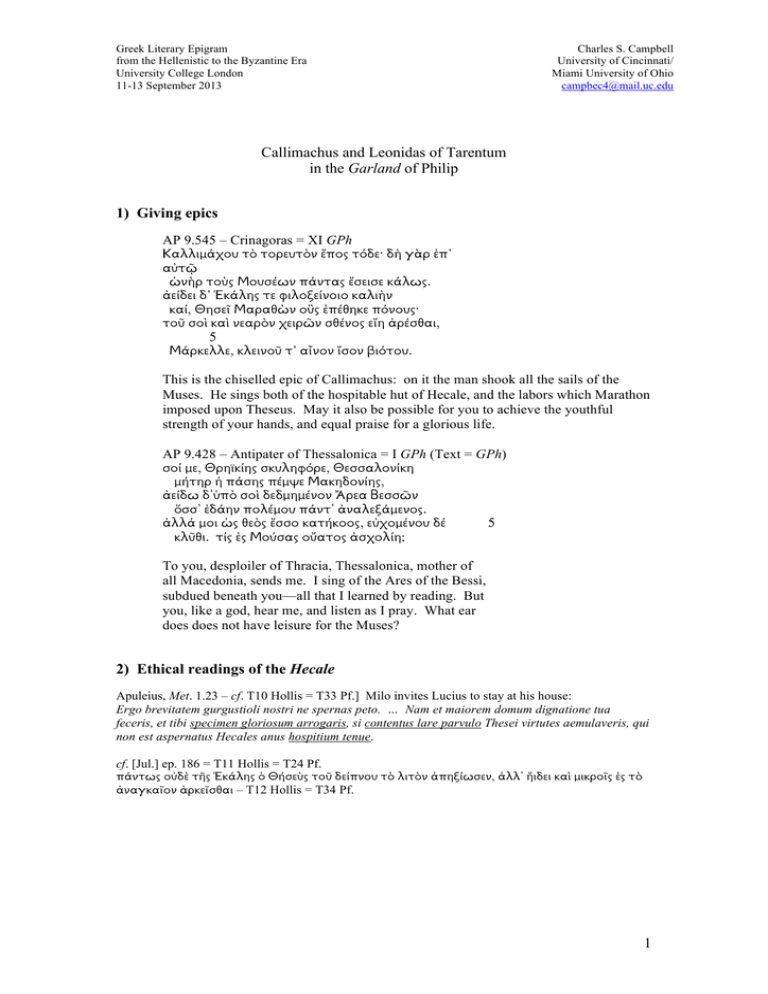
Greek Literary Epigram from the Hellenistic to the Byzantine Era University College London 11-13 September 2013 Charles S. Campbell University of Cincinnati/ Miami University of Ohio campbec4@mail.uc.edu Callimachus and Leonidas of Tarentum in the Garland of Philip 1) Giving epics AP 9.545 – Crinagoras = XI GPh Καλλιµάχου τὸ τορευτὸν ἔπος τόδε· δὴ γὰρ ἐπ’ αὐτῷ ὡνὴρ τοὺς Μουσέων πάντας ἔσεισε κάλως. ἀείδει δ’ Ἑκάλης τε φιλοξείνοιο καλιὴν καί, Θησεῖ Μαραθὼν οὓς ἐπέθηκε πόνους· τοῦ σοὶ καὶ νεαρὸν χειρῶν σθένος εἴη ἀρέσθαι, 5 Μάρκελλε, κλεινοῦ τ’ αἶνον ἴσον βιότου. This is the chiselled epic of Callimachus: on it the man shook all the sails of the Muses. He sings both of the hospitable hut of Hecale, and the labors which Marathon imposed upon Theseus. May it also be possible for you to achieve the youthful strength of your hands, and equal praise for a glorious life. AP 9.428 – Antipater of Thessalonica = I GPh (Text = GPh) σοί µε, Θρηϊκίης σκυληφόρε, Θεσσαλονίκη µήτηρ ἡ πάσης πέµψε Μακηδονίης, ἀείδω δ᾽ὑπὸ σοὶ δεδµηµένον Ἄρεα Βεσσῶν ὅσσ᾽ ἐδάην πολέµου πάντ᾽ ἀναλεξάµενος. ἀλλά µοι ὡς θεὸς ἔσσο κατήκοος, εὐχοµένου δέ 5 κλῦθι. τίς ἐς Μούσας οὔατος ἀσχολίη; To you, desploiler of Thracia, Thessalonica, mother of all Macedonia, sends me. I sing of the Ares of the Bessi, subdued beneath you—all that I learned by reading. But you, like a god, hear me, and listen as I pray. What ear does does not have leisure for the Muses? 2) Ethical readings of the Hecale Apuleius, Met. 1.23 – cf. T10 Hollis = T33 Pf.] Milo invites Lucius to stay at his house: Ergo brevitatem gurgustioli nostri ne spernas peto. … Nam et maiorem domum dignatione tua feceris, et tibi specimen gloriosum arrogaris, si contentus lare parvulo Thesei virtutes aemulaveris, qui non est aspernatus Hecales anus hospitium tenue. cf. [Jul.] ep. 186 = T11 Hollis = T24 Pf. πάντως οὐδὲ τῆς Ἑκάλης ὁ Θήσεὺς τοῦ δείπνου τὸ λιτὸν ἀπηξίωσεν, ἀλλ᾽ ἤιδει καὶ µικροῖς ἐς τὸ ἀναγκαῖον ἀρκεῖσθαι – T12 Hollis = T34 Pf. 1 Greek Literary Epigram from the Hellenistic to the Byzantine Era University College London 11-13 September 2013 Charles S. Campbell University of Cincinnati/ Miami University of Ohio campbec4@mail.uc.edu 3) The epigrammatist in high society Philodemus AP 11.44 = GPh XXIII = Sider 27 αὔριον εἰς λιτήν σε καλιάδα, φίλτατε Πείσων, ἐξ ἐνάτης ἕλκει µουσοφιλὴς ἕταρος εἰκάδα δειπνίζων ἐνιαύσιον· εἰ δ’ ἀπολείψῃς οὔθατα καὶ Βροµίου Χιογενῆ πρόποσιν, ἀλλ’ ἑτάρους ὄψει παναληθέας, ἀλλ’ ἐπακούσῃ Φαιήκων γαίης πουλὺ µελιχρότερα· ἢν δέ ποτε στρέψῃς καὶ ἐς ἡµέας ὄµµατα, Πείσων, ἄξοµεν ἐκ λιτῆς εἰκάδα πιοτέρην. 5 Tomorrow at three your Muse-loving friend drags you to his humble cottage, oh dearest Piso, to feed you your yearly dinner celebrating The Twentieth. If you miss sows-udders and toasts of Chian wine, nevertheless you will see true friends and hear things sweeter than the Phaeacian tales. And if you turn your eyes towards us, oh Piso, we shall celebrate a richer, rather than a humbler, Twentieth. 4) Simple food in a Meleagrean context AP 6.300 - Leonidas of Tarentum = XXXVI HE Λαθρίη, ἐκ πλάνιος ταύτην χάριν ἔκ τε πενέστεω κἠξ ὀλιγησιπύου δέξο Λεωνίδεω, ψαιστά τε πιήεντα καὶ εὐθήσαυρον ἐλαίην καὶ τοῦτο χλωρὸν σῦκον ἀποκράδιον κεὐοίνου σταφυλῆς ἔχ’ ἀποσπάδα πεντάρρωγον, πότνια, καὶ σπονδὴν τήνδ’ ὑποπυθµίδιον. ἢν δέ µ’ ἔθ’, ὡς ἐκ νούσου ἀνειρύσω, ὧδε καὶ ἐχθρῆς ἐκ πενίης ῥύσῃ, δέξο χιµαιροθύτην. 5 Lathria, accept this offering from wandering, impoverished Leonidas, he of the small mealtub: rich cakes and long-stored olive oil, this green fig fresh from the branch and this bunch of five grapes from the vine, oh goddess, good for wine, along with this libation from the bottom of the jar. And if you also save me from hateful poverty, as you saved me from illness, receive (me as) a goat-sacrificer. AP 6.301 – Callimachus = XXVIII HE = 47 Pfeiffer τὴν ἁλίην Εὔδηµος, ἐφ᾽ ἧς ἅλα λιτὸν ἐπέσθων χειµῶνας µεγάλους ἐξέφυγεν δανέων, θῆκε θεοῖς Σαµόθρᾳξι, λέγων ὅτι τήνδε κατ᾽ εὐχήν, ὦ λαοί, σωθεὶς ἐξ ἁλὸς ὧδε θέτο. Eudemus dedicated his salt-box to the Samothracian gods, the box aboard which—eating his humble salt—he weathered great storms of debts, saying, O people, that he placed it here since in accordance with his prayer he had been saved from the salt/sea. 2 Greek Literary Epigram from the Hellenistic to the Byzantine Era University College London 11-13 September 2013 Charles S. Campbell University of Cincinnati/ Miami University of Ohio campbec4@mail.uc.edu AP 6.302 – Leonidas of Tarentum = XXXVII HE (Text = HE) Φεύγεθ’ ὑπὲκ καλύβης, σκότιοι µύες· οὔτι πενιχρή µῦς σιπύη βόσκειν οἶδε Λεωνίδεω. αὐτάρκης ὁ πρέσβυς ἔχων ἅλα καὶ δύο κρίµνα· ἐκ πατέρων ταύτην ᾐνέσαµεν βιοτήν. τῷ τί µεταλλεύεις τοῦτον µυχόν, ὦ φιλόλιχνε, 5 οὐδ’ ἀποδειπνιδίου γευόµενος σκυβάλου; σπεύδων εἰς ἄλλους οἴκους ἴθι--τἀµὰ δὲ λιτά-ὧν ἄπο πλειοτέρην οἴσεαι ἁρµαλιήν. Get out of my hut you shadowy mice! The poor mealtub of Leonidas does not know how to feed mice. An old man is self-sufficient if he has salt and two biscuits: this is the life-style we have adopted from our ancestors. Why do you mine this corner, oh glutton, getting to taste not even an after-dinner scrap? Hurry off to other houses—my means are slight—from which you’ll get a richer store. AP 6.303 - Ariston = III HE ὦ µύες, εἰ µὲν ἐπ᾽ ἄρτον ἐληλύθατ᾽, ἐς µυχὸν ἄλλον στείχετ᾽-ἐπεὶ λιτὴν οἰκέοµεν καλύβηνοὗ καὶ πίονα τυρὸν ἀποδρέψεσθε καὶ αὔην ἰσχάδα καὶ δεῖπνον συχνὸν ἀπὸ σκυβάλων· εἰ δ᾽ἐν ἐµαῖς βύβλοισι πάλιν καταθήξετ᾽ ὀδόντα κλαύσεσθ᾽, οὐκ ἀγαθὸν κῶµον ἐπερχόµενοι. 5 Oh mice, if you have come for bread, head to another house, for I inhabit a humble hut. There, you’ll get rich cheese and a dry fig and a great feast of leftovers. But if, on the other hand, you sharpen your tooth on my books again, you will lament that you have come to no good banquet. 5) Philodemus’ imitation and variation of multiple epigrams from the Meleagrean sequence AP 6.300-303 Ariston AP 6.303.1-2 ὦ µύες, εἰ µὲν ἐπ᾽ ἄρτον ἐληλύθατ᾽, ἐς µυχὸν ἄλλον στείχετ᾽-ἐπεὶ λιτὴν οἰκέοµεν καλύβηνPhilodemus AP 11.44.1-2 αὔριον εἰς λιτήν σε καλιάδα, φίλτατε Πείσων, ἐξ ἐνάτης ἕλκει µουσοφιλὴς ἕταρος Leonidas AP 6.300.7-8 ἢν δέ µ’ ἔθ’, ὡς ἐκ νούσου ἀνειρύσω, ὧδε καὶ ἐχθρῆς ἐκ πενίης ῥύσῃ, δέξο χιµαιροθύτην. Philodemus AP 11.44.7-8 ἢν δέ ποτε στρέψῃς καὶ ἐς ἡµέας ὄµµατα, Πείσων, ἄξοµεν ἐκ λιτῆς εἰκάδα πιοτέρην. Address with prohibition from the καλύβη Address with invitation to the καλιάς And if you also save me from hateful poverty, as you saved me from illness, receive a fat goat. And if you turn your eyes towards us, oh Piso, we shall celebrate a richer, rather than a humbler, Twentieth. 3 Greek Literary Epigram from the Hellenistic to the Byzantine Era University College London 11-13 September 2013 Charles S. Campbell University of Cincinnati/ Miami University of Ohio campbec4@mail.uc.edu 5) … Ariston AP 6.303.5-6 εἰ δ᾽ἐν ἐµαῖς βύβλοισι πάλιν καταθήξετ᾽ ὀδόντα κλαύσεσθ᾽, οὐκ ἀγαθὸν κῶµον ἐπερχόµενοι. Philodemus AP 11.44.7-8 ἢν δέ ποτε στρέψῃς καὶ ἐς ἡµέας ὄµµατα, Πείσων, ἄξοµεν ἐκ λιτῆς εἰκάδα πιοτέρην. But if, on the other hand, you lay a tooth on my books, you will lament that you have come to no good banquet. And if you turn your eyes towards us, oh Piso, we shall celebrate a richer, rather than a humbler, Twentieth. • Leonidas’ litotes becomes Epicurean litotes Leonidas AP 6.302.7-8 σπεύδων εἰς ἄλλους οἴκους ἴθι (τἀµὰ δὲ λιτά), ὧν ἄπο πλειοτέρην οἴσεαι ἁρµαλιήν. Philodemus AP 11.44.7-8 ἢν δέ ποτε στρέψῃς καὶ ἐς ἡµέας ὄµµατα, Πείσων, ἄξοµεν ἐκ λιτῆς εἰκάδα πιοτέρην. Hurry off to other houses—my means are slight— from which you’ll get a richer store. And if you turn your eyes towards us, oh Piso, we shall celebrate a richer, rather than a humbler, Twentieth. 6) … and of Callimachus Hymn 2.8-10 ὡπόλλων οὐ παντὶ φαείνεται, ἀλλ’ ὅτις ἐσθλός· ὅς µιν ἴδῃ, µέγας οὗτος, ὃς οὐκ ἴδε, λιτὸς ἐκεῖνος. ὀψόµεθ’, ὦ Ἑκάεργε, καὶ ἐσσόµεθ’ οὔποτε λιτοί. 10 Apollo does not appear to everyone, but only to him who is worthy. He who sees him is great, and he who doesn’t is small. We will see, O Far-shooter, and we will no longer be small. Philodemus AP 11.44.7-8 ἢν δέ ποτε στρέψῃς καὶ ἐς ἡµέας ὄµµατα, Πείσων, ἄξοµεν ἐκ λιτῆς εἰκάδα πιοτέρην. And if you turn your eyes towards us, oh Piso, we shall celebrate a richer, rather than a humbler, Twentieth. 7) The epigrammatist goes to Italy Crinagoras AP 9.559 = GPh XXXII πλοῦς µοι ἐπ᾽ Ἰταλίην ἐντύνεται· ἐς γὰρ ἑταίρους στέλλοµαι, ὧν ἤδη δηρὸν ἄπειµι χρόνον. διφέω δ᾽ ἡγητῆρα περίπλοον, ὅς µ᾽ ἐπὶ νήσους Κυκλάδας ἀρχαίην τ᾽ ἄξει ἐπὶ Σχερίην. σύν τί µοι ἀλλά, Μένιππε, λάβευ φίλος, ἵστορα κύκλον 5 γράψας, ὦ πάσης ἴδρι γεωγραφίης. I am planning a voyage to Italy, for I’m going to see friends I’ve been away from for a long time. But I need a periplous to guide me, which will take me to the Cycladic Islands and ancient Scheria. Help me out, my dear Menippus, by writing a learned “Tour”, you who are knowledgeable in all aspects of geography. 4 Greek Literary Epigram from the Hellenistic to the Byzantine Era University College London 11-13 September 2013 Charles S. Campbell University of Cincinnati/ Miami University of Ohio campbec4@mail.uc.edu 8) The epigrammatist leaves Italy AP 7.715 - Leonidas of Tarentum = XCIII HE Πολλὸν ἀπ’ Ἰταλίης κεῖµαι χθονὸς ἔκ τε Τάραντος πάτρης· τοῦτο δέ µοι πικρότερον θανάτου. τοιοῦτος πλανίων ἄβιος βίος· ἀλλά µε Μοῦσαι ἔστερξαν, λυγρῶν δ’ ἀντὶ µελιχρὸν ἔχω. οὔνοµα δ’ οὐκ ἤµυσε Λεωνίδου· αὐτά µε δῶρα 5 κηρύσσει Μουσέων πάντας ἐπ’ ἠελίους. Far from Italy and from my fatherland of Taras I lie; this to me is more bitter than death. This kind of wandering life is lifeless, but the Muses have looked kindly upon me, and so instead of pains I have what is sweet. The name of Leonidas will not dim: the gifts of the Muses will herald me for all time. 9) Verbal/graphic, geographical, and emotional oppositio in imitando: • ≈ Πολλὸν ἀπ’ Ἰταλίης πλοῦς µοι ἐπ᾽ Ἰταλίην Leonidas AP 7.715.1 (Handout 8) Crinagoras AP 9.559.1 (Handout 7) • ≈ ἔκ τε Τάραντος ἐς γὰρ ἑταίρους Leonidas AP 7.715.1 (Handout 8) Crinagoras AP 9.559.1 (Handout 7) 10) Inclusion and Exclusion AP 11.20 - Antipater of Thessalonica = XX GPh Φεύγεθ’, ὅσοι λόκκας ἢ λοφνίδας ἢ καµασῆνας ᾄδετε, ποιητῶν φῦλον ἀκανθολόγων, οἵ τ’ ἐπέων κόσµον λελυγισµένον ἀσκήσαντες κρήνης ἐξ ἱερῆς πίνετε λιτὸν ὕδωρ. σήµερον Ἀρχιλόχοιο καὶ ἄρσενος ἦµαρ Ὁµήρου 5 σπένδοµεν· ὁ κρητὴρ οὐ δέχεθ’ ὑδροπότας. Away all you who sing of ‘loccae’ (cloaks) or ‘lophnides’ (torches) or ‘camasenes’ (fish), you race of thorn-gathering poets, who trick out the twisted ornament of your verse and drink humble water from a sacred spring. Today we pour libations in honor of the birthday of Archilochus and Homer: the krater does not receive water-drinkers. 11) Antipater’s art of variation (cf. Knox, 1985) a) Expelling the undesirables: Callimachus Aet. fr. 1.7 Pf. ......].[.] καὶ Τε[λ]χῖσιν ἐγὼ τόδε· ῾φῦλον α[ Antipater AP 11.20.2 Φεύγεθ’, ὅσοι λόκκας ἢ λοφνίδας ἢ καµασῆνας ᾄδετε, ποιητῶν φῦλον ἀκανθολόγων … and to the Telchines I say this: “you […] race …” Away with you, all who sing of ‘loccae’ or lophnides’ or ‘camasenes’, you race of thorn gathering poets.” 5 Greek Literary Epigram from the Hellenistic to the Byzantine Era University College London 11-13 September 2013 Charles S. Campbell University of Cincinnati/ Miami University of Ohio campbec4@mail.uc.edu 11b) poetic water-sources: Callimachus, Hymn to Apollo, 110-12 Δηοῖ δ’ οὐκ ἀπὸ παντὸς ὕδωρ φορέουσι µέλισσαι, ἀλλ’ ἥτις καθαρή τε καὶ ἀχράαντος ἀνέρπει πίδακος ἐξ ἱερῆς ὀλίγη λιβὰς ἄκρον ἄωτον. The Bees do not bring water to Demeter from every source, but only the small stream, the very choicest part, which emerges pure and clear from the sacred fountain. Antipater, AP 11.20.4 κρήνης ἐξ ἱερῆς πίνετε λιτὸν ὕδωρ … drink humble water from a sacred spring. 11c) liquid goods and dry goods: Antipater, AP 11.20.6 … ὁ κρητὴρ οὐ δέχεθ’ ὑδροπότας. Leonidas, AP 6.302.1-2 = Handout 2c … οὔτι πενιχρή µῦς σιπύη βόσκειν οἶδε Λεωνίδεω. … the mixing bowl does not receive water-drinkers. … the poor meal-tub of Leonidas does not know how to feed mice. 11d) compare the language of religious prohibition: • Φῦγε ἀπ᾽ ἐµοῦ, πᾶν κακόν, πᾶν πο[νηρόν] (P. Gr. Mag. II, P 5 d), cited by Robert, 1965, v. 13, 270. • SGO 1.01.17.01 (in Petrovic, 2011, 269), temple programma: … πόρρω ἀπ᾽ ἀθανάτων ἔργεο καὶ τεµένους· | οὐ στέργει φαύλους ἱερὸς δόµος ... (date uncertain) 12) Giving epigrams (or not) Antipater of Thessalonica AP 9.92 Ἀρκεῖ τέττιγας µεθύσαι δρόσος· ἀλλὰ πιόντες ἀείδειν κύκνων εἰσὶ γεγωνότεροι. ὣς καὶ ἀοιδὸς ἀνὴρ ξενίων χάριν ἀνταποδοῦναι ὕµνους εὐέρκταις οἶδε παθὼν ὀλίγα. τοὔνεκά σοι πρώτως µὲν ἀµείβοµεν· ἢν δ’ ἐθέλωσιν 5 Μοῖραι, πολλάκι µοι κείσεαι ἐν σελίσιν. A little dew is enough to intoxicate cicadas, but when they drink it, they are louder singers than swans. So too a poet knows how to give poems as recompense to benefactors even when he has received just a little kindness. This is why I’ve written to you, and if the Moirai should wish it, you will often lie in my pages. 13) A Leonidean point of reference: AP 7.655 – Leonidas of Tarentum = XVII HE Ἀρκεῖ µοι γαίης µικρὴ κόνις, ἡ δὲ περισσή ἄλλον ἐπιθλίβοι πλούσια κεκλιµένον στήλη, τὸ σκληρὸν νεκρῶν βάρος. εἴ µε θανόντα γνώσοντ᾽, Ἀλκάνδρῳ τοῦτο τί Καλλιτέλευς; A slight dusting of earth suffices for me. Let the extravagant gravestone, a troublesome weight for corpses, vex some other man opulently buried. What difference does it make to Alkandros the son of Kalliteles whether or not people know me when I am dead? 6 Greek Literary Epigram from the Hellenistic to the Byzantine Era University College London 11-13 September 2013 Charles S. Campbell University of Cincinnati/ Miami University of Ohio campbec4@mail.uc.edu 14) A Callimachean point of reference: AP 9.92.6 - Antipater … πολλάκι µοι κείσεαι ἐν σελίσιν. Aet. fr. 1.1 πολλάκι µοι Τελχῖνες … 14) The epigrammatist outside of high society AP 9.43 - Parmenion = VI GPh Ἀρκεῖ µοι χλαίνης λιτὸν σκέπας, οὐδὲ τραπέζαις δουλεύσω Μουσέων ἄνθεα βοσκόµενος. µισῶ πλοῦτον ἄνουν, κολάκων τροφόν, οὐδὲ παρ’ ὀφρὺν στήσοµαι· οἶδ’ ὀλίγης δαιτὸς ἐλευθερίην. The humble covering of a cloak suffices for me, and I will not slave at banquets since I feed on the flowers of the Muses. I hate thoughtless wealth, the nourishment of flatterers, and I will not stand at attention for the proud: I know the freedom of a humble meal. 15) Callimachean invective AP 12.43 – Callimachus Ἐχθαίρω τὸ ποίηµα τὸ κυκλικὸν οὐδὲ κελεύθῳ χαίρω τὶς πολλοὺς ὧδε καὶ ὧδε φέρει· µισέω καὶ περίφοιτον ἐρώµενον, οὐδ᾽ ἀπὸ κρήνης πίνω· σικχαίνω πάντα τὰ δηµόσια. Λυσανίη σὺ δὲ ναίχι καλὸς καλός· ἀλλὰ πρὶν εἰπεῖν τοῦτο σαφῶς ἠχώ φησί τις ῾ἄλλος ἔχει᾽. I hate the cyclic poem, and do not like the path that carries many hither and thither. I also loath the promiscuous beloved, nor do I drink from the public fountain. I detest all things common. And you, Lysanias, yes you are beautiful—beautiful! But before I’ve uttered this, an echo clearly says “another has him”. 7 Greek Literary Epigram from the Hellenistic to the Byzantine Era University College London 11-13 September 2013 Charles S. Campbell University of Cincinnati/ Miami University of Ohio campbec4@mail.uc.edu Select Bibliography Bettenworth, A. 2012. “Phaeacians at the birthday party: A.P. 11.44 (Philodemus) and its epic background.” Aitia 2: online publication: http://aitia.revues.org/380. Bowersock, G. 1965. Augustus and the Greek World. Oxford: Clarendon Press. Coco, L. 1985. “Leonida di Taranto.” C&S 95: 61-67. Cogitore, I. 2010. “Crinagoras et les poètes de la Couronne de Philippe : la cour impériale romaine dans les yeux des Grecs.” In Savalli-Lestrade, I. and I. Cogitore, eds. Des rois au prince : pratiques du pouvoir monarchique dans l'Orient hellénistique et romain (IVe siècle avant J.-C.-IIe siècle après J.-C.). Grenoble: ELLUG, Université Stendhal. 253-69. Geffcken, J. 1896. Leonidas von Tarent. Leipzig: B.G. Teubner. Gigante, M. 1971. L’edera di Leonida. Naples: Morano. ------. 1992. Cinismo e Epicureismo. Naples: Bibliopolis. Gow, A.S.F. and D.L. Page, eds. 1965. The Greek Anthology: Hellenistic Epigrams. Cambridge: Cambridge University Press. 2 vols. ------. 1968. The Greek Anthology: The Garland of Philip, and some contemporary epigrams. London: Cambridge University Press. Gordon, P. 2012. The Invention and Gendering of Epicurus. Ann Arbor: University of Michigan Press. Gowers, E. 1993. The Loaded Table: Representations of Food in Roman Literature. Oxford: Clarendon Press. Gutzwiller, K. J. 1998. Poetic Garlands: Hellenistic Epigrams in Context. Berkeley: University of California Press. ------. 2012. “Catullus and the Garland of Meleager.” In Du Quesnay, I. and T. Woodman, eds. Catullus: Poems, Books, Readers. Cambridge: Cambridge University Press. 79-111. Hollis, A. S. 2009. Callimachus: Hecale. 2nd ed. Oxford: Oxford University Press. Knox, P. 1985. “Wine, Water, and Callimachean Polemics.” HSP 89: 107-119. Laurens, P. 1965a. “Martial et l’epigramme grecque du 1er siècle ap. J. C.” Revue des Études Latines, 43: 31541. Laurens, P. 1965b. “À propos d’une image catullienne (c. 70, 4).” Latomus 24: 545-50. Meyer, D. and E. Wirbelauer. 2007. “Rom und die Römer in griechischen Epigrammen.” In M.-L. Freyburger and D. Meyer, eds. Visions grecques de Rome. Paris: de Boccard. 319-346. Petrovic, I. 2011. “Callimachus and contemporary religion: the Hymn to Apollo.” In Acosta-Hughes, B., L. Lehnus, and S. Stephens, eds. Brill’s Companion to Callimachus. Leiden: Brill. 264-285. Pfeiffer, R. ed. 1949. Callimachus. Oxford: Clarendon Press. Piacenza, N. 2010. “Callimaco, Leonida di Taranto e la poetica dell’ὀλίγος: spunti per un confronto e per una rilettura di AP 6,300 e 302.” Appunti Romani di Filologia, 12: 79-92. Puglia, E. 1992. Il libro offeso: insetti carticoli e roditori nelle biblioteche antiche. Napoli: Liguori editore. Robert, L. 1965. Hellenica: Recueil d’Épigraphie, de Numismatique, et d’Antiquités Grecques. 13 vols. Paris: Librairie d’Amérique et d’Orient. Sens, A. 2007. “One thing leads (back) to another,” in Bing, P. and J. S. Bruss eds. Brill’s Companion to Hellenistic Epigram. Leiden: Brill. 373-390. Sider, D. 1997. The Epigrams of Philodemos. Oxford: Oxford University Press. Tarán, S.L. 1979. The Art of Variation in the Hellenistic Epigram. Leiden: E.J. Brill. Ypsilanti, M. 2006. “An aspect of Leonidas’ reception in later epigrammatists and the art of variation. The case of fishermen in epitaphs.” CP 101: 67-73. 8
